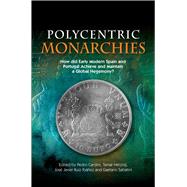Polycentric Monarchies How Did Early Modern Spain and Portugal Achieve and Maintain a Global Hegemony?
, by Cardim, Pedro; Herzog, Tamar; Ibanez, Jose Javier Ruiz; Sabatini, Gaetano- ISBN: 9781845196813 | 1845196813
- Cover: Paperback
- Copyright: 6/1/2014
In the early 16th century - having succeeded in establishing themselves in Europe, Asia, Africa, and the Americas - Spain and Portugal became the first imperial powers on a worldwide scale. Between 1580 and 1640, when these two entities were united, they achieved an almost global hegemony, constituting the largest political force in Europe and abroad. Although they lost their political primacy in the 17th century, both monarchies survived and were able to enjoy a relative success until the early 19th century. This collection answers the question as to how and why their cultural and political legacies persist to date. Part I of the book focuses on the construction of the monarchy, examining the ways different territories were integrated into the imperial network, mainly by inquiring to what extent local political elites maintained their autonomy and to what a degree they shared power with the royal administration. Part II deals primarily with the circulation of ideas, models, and people, observing them as they move in space. It also examines how they coincide in the court, which was a veritable melting pot in which the various administrations that served the kings and the various territories belonging to the monarchy developed their own identities, fought for recognition in what they considered their proper place in the global hierarchy. Part III explains the forms of dependence and symbiosis that were established with other European powers, such as Genoa and the United Provinces. Attempting to reorient the politics of these States, political and financial co-dependence often led to bad economic choices. The book discards the portrayal of the Iberian monarchies as the accumulation of many bilateral relations arranged in a radial pattern, arguing that these political entities were polycentric - that is to say, they allowed for the existence of many different centers which interacted and thus participated in the making of empire. The resulting political structure was complex and unstable, albeit with a general adhesion to a discourse of loyalty to king and religion.







